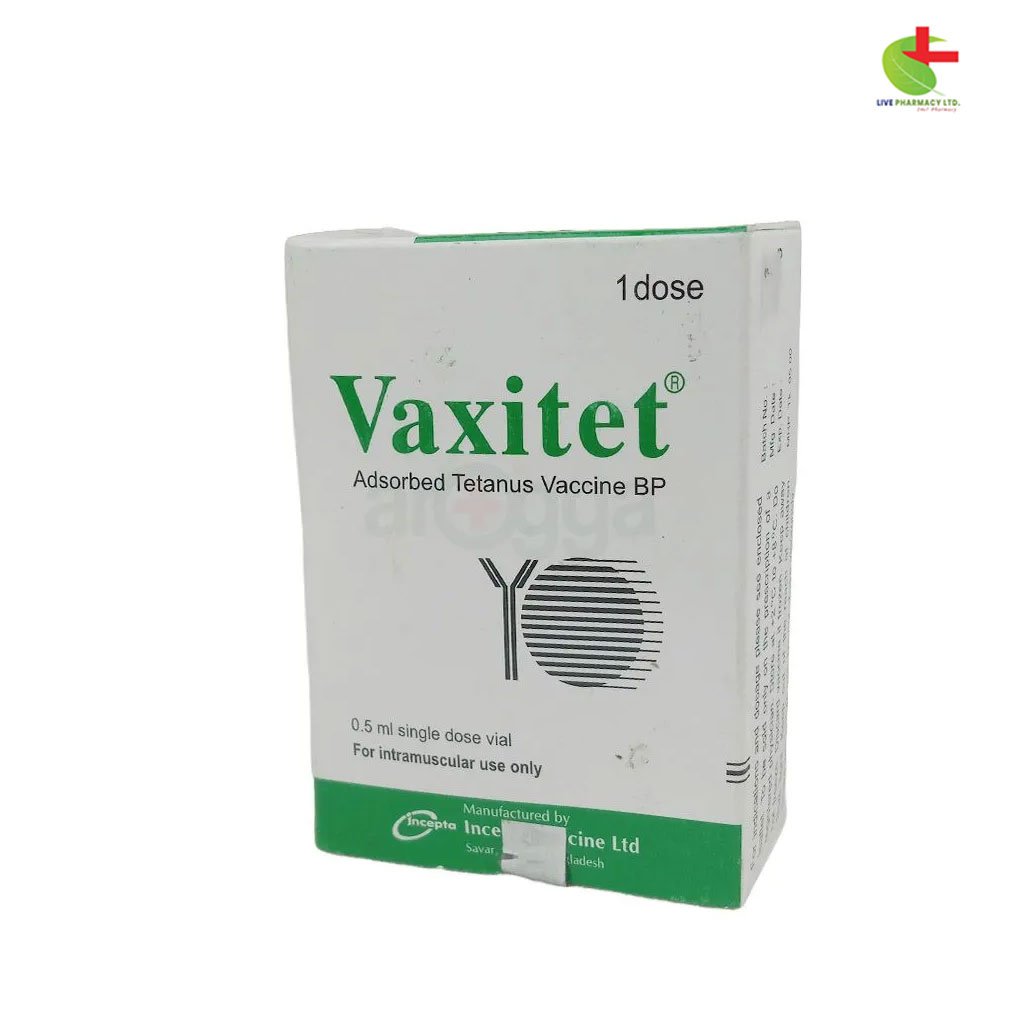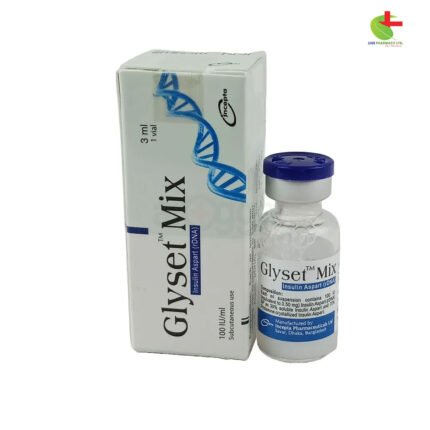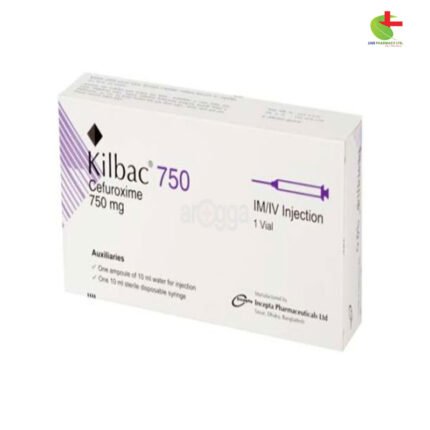Vaxitet Ampoule
60.00৳ Dose (1)
- Vaxitet is a vaccine used for the prevention of tetanus in individuals aged 7 years and older, as well as for pregnant women to protect newborns from neonatal tetanus.
- Developed by Incepta Pharmaceuticals Ltd., it is safe for individuals with HIV and can be administered alongside other vaccines.
- Recommended for those at risk of tetanus infection, including outdoor workers and athletes, Vaxitet helps maintain immunity through a structured immunization schedule.
 Brand
Brand
|
Incepta Pharmaceuticals Ltd |
|---|---|
 Generics
Generics
|
Adsorbed tetanus vaccine |
 Type
Type
|
IM Injection |
Indications
This vaccine is essential for preventing tetanus in individuals aged 7 and above, particularly those at risk of exposure, such as gardeners, farm workers, and athletes. It also plays a crucial role in preventing neonatal tetanus by immunizing women of childbearing age, and is recommended following injuries to prevent tetanus infection. The vaccine can be safely administered alongside other vaccines, including BCG, Measles, Polio (both IPV and OPV), Hepatitis B, Yellow Fever, Haemophilus influenzae type B, and Varicella.
HIV Infection: Vaxitet is suitable for children with known or suspected HIV infection. Although current data is limited, there have been no reported increases in adverse reactions among symptomatic or asymptomatic HIV-infected children.
Consult a registered healthcare professional before use.
Pharmacology
Tetanus toxoid (adsorbed) BP is produced by detoxifying the sterile filtrate from Clostridium tetani broth cultures using formalin and heat. The toxoid is purified chemically and then adsorbed onto aluminium phosphate as an adjuvant. Thiomersal is included as a preservative. This vaccine appears as a greyish-white suspension and is free from horse serum proteins, thereby minimizing the risk of sensitization to equine-derived substances. It complies with WHO standards as tested by their outlined methods (WHO TRS. 1990, 800).
Dosage & Administration
The standard immunization schedule against tetanus comprises two primary doses of 0.5 ml each, spaced at least four weeks apart, followed by a third dose given 6-12 months later. To sustain immunity, booster doses of 0.5 ml are advised at regular intervals, typically every 5 to 10 years for adults.
Protection for Newborns Against Tetanus: For neonatal tetanus prevention, the Tetanus Toxoid vaccine is recommended for immunizing women of childbearing age, especially those who are pregnant. The vaccine can be safely given during pregnancy, ideally at the first healthcare contact or as soon as possible. A five-dose schedule is suggested for unimmunized women: after the initial three doses, two additional boosters should be administered, at least one year apart or during subsequent pregnancies.
Vaccination of Injured Persons: Individuals who have completed their primary tetanus immunization or received a booster within the last five years generally do not require another dose. If more than five years have passed and there is a suspected tetanus infection due to an injury, a 0.5 ml dose of Tetanus Toxoid vaccine should be administered immediately. In cases of inadequate immunization history, a combination of 1500 IU (3000 old AU) of tetanus antiserum and 0.5 ml of Tetanus Toxoid should be injected at separate sites with different syringes. If available, 250 units of tetanus immune globulin (human origin) may replace the antiserum. A second 0.5 ml Tetanus Toxoid dose is recommended two weeks later, followed by a third dose after one month.
Caution: If using horse-origin tetanus antiserum, test for sensitivity to horse serum protein beforehand. Always have 1 ml of Adrenaline solution (1:1000) readily available and follow standard precautions during antitoxin administration.
Inoculation Method: The vaccine should be administered intramuscularly into the deltoid muscle of older children and women. Ensure that only sterile needles and syringes are used for each injection. Shake the vaccine well before use. Once opened, multi-dose vials should be stored between 2°C and 8°C.
Reactions
Most reactions to the vaccine are mild and localized at the injection site, which may include some inflammation, mild fever, malaise, and irritability. In rare cases, a nodule may form at the injection site. Individuals who have received numerous booster immunizations may experience more pronounced reactions.
Consult a registered healthcare professional before use.
Interactions
If passive immunization is required for tetanus, TIG (Human) is the preferred product, offering longer-lasting protection with fewer adverse reactions than animal-derived antitoxin. As with all intramuscular injections, use caution in patients undergoing anticoagulant therapy, as immunosuppressive treatments may diminish vaccine effectiveness.
Contraindications
This vaccine should not be administered to anyone with a history of severe reactions to previous doses of tetanus toxoid. Immunization should be postponed during any febrile illness or acute infection. However, mild febrile illnesses, such as a common cold, do not typically preclude immunization.
Side Effects
Vaxitet is usually well-tolerated, with most individuals experiencing moderate and brief reactions. Common local reactions include redness, swelling, and tenderness at the injection site, while systemic reactions like malaise and slight fever are less frequent.
Pregnancy & Lactation
To protect against neonatal tetanus, the Tetanus Toxoid vaccine is highly recommended for women of childbearing age, particularly those who are pregnant. It can be safely administered during pregnancy, preferably at the earliest contact. It is unknown if tetanus toxoid passes into breast milk; it may be given to nursing mothers only if absolutely necessary.
Precautions & Warnings
For severe anaphylactic reactions, the initial adrenaline dose is 0.1-0.5 mg (0.1-0.5 ml of 1:1000 injection), administered subcutaneously or intramuscularly. Do not exceed 1 mg (1 ml) in a single dose. For infants and children, the recommended dose is 0.01 mg/kg (0.01 ml/kg of 1:1000 injection), with a maximum single pediatric dose of 0.5 mg (0.5 ml). Immediate use of adrenaline is crucial for suspected anaphylaxis and can be life-saving.
As with all vaccinations, individuals should be observed for at least 30 minutes post-administration for any early allergic reactions. Keep Hydrocortisone Sodium Succinate and antihistamines available, along with oxygen inhalation support.
Reactions may increase in frequency and severity with booster doses in previously immunized individuals. Ensure the injection does not enter a blood vessel.
When returning for subsequent doses, it is vital to inquire about any adverse reactions experienced after the previous vaccination.
Therapeutic Class
Vaccines, Anti-sera & Immunoglobulin
Storage Conditions
Keep out of reach of children. Store between 2°C to 8°C. Ensure transportation occurs within this temperature range. Do not freeze; discard the vaccine if frozen, and protect it from light.













Reviews
There are no reviews yet.